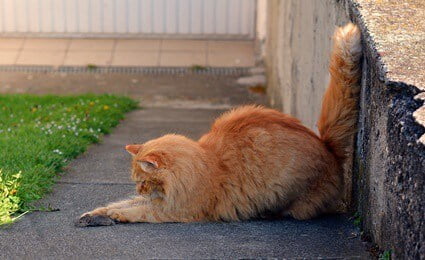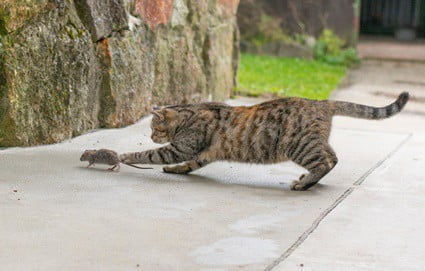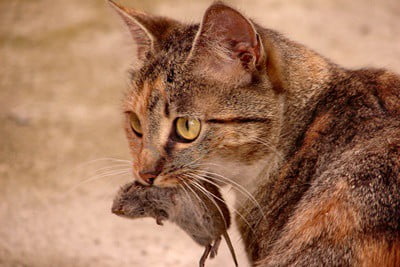Cats are excellent mousers. That’s why they’ve been used in homes for centuries, even millennia, to help curb pest infestations. The feline instincts are well-tailored for reacting to the quick movements, scurrying sounds, and darting nature of mice. However, in your modern home, it’s smart to keep your cat from eating its kill. Mice can be a hazard to your cat’s health, even if your feline doesn’t know it.
Cats can become ill from eating mice, so it is important to dispose of any gifts they bring you. Mice are carriers of disease, bacteria, and parasites. Your cat can easily contract any of these ailments by eating, biting, or playing with an infected mouse. Cats can also get secondary poisoning from eating a mouse that’s been exposed to pesticide, which can be fatal.
Your cat doesn’t need to be barred from hunting. However, it shouldn’t be allowed to play with or eat any rodents it kills. Aside from a mess of internal parasites, like pinworms and tapeworms, mice are riddled with fleas. Fleas themselves can be carriers of disease and even more parasites. As such, even if the cat doesn’t eat the mouse, the carcass presents risks, so remove it from your cat as soon as you can.
Can Eating Mice Make Cats Sick?
Mice are known to carry up to 35 kinds of disease, each of which can be spread even post-mortem. If your cat does a great job of capturing its prey in your home, it can then be exposed to these pathogens.
Depending on what the mouse was carrying, be it pesticide or disease, your cat might manifest symptoms in as little as a few hours. This becomes even more dangerous after the mouse is dead. As decomposition sets in, certain types of parasites and bacteria will thrive on the corpse or potentially seek a new host.
If your cat does not immediately eat it, it may play with the mouse. Knocking it around your home will spread the disease and expose members of your household to sickness. At the bare minimum, the cat will be spreading parasites, bacteria, and even pesticides around its play area. Even once you get rid of the mouse, the cat will still be in these areas and may get infected.
That makes it important to remove any dead mice as soon as you find them. The good news is, cats are boastful hunters. Yours is likely to bring its kill right to your feet.
Is It Safe For Cats To Eat Mice?
In both domestic settings and the wild, cats naturally hunt mice. They are the perfect predators for these rodents, and mice serve as the ideal prey. As such, it seems outlandish to think your cat will be unsafe eating a mouse. Surely its digestive system is perfectly built to handle this prey.
In truth, mice are dangerous to cats because of what they carry, not what they are. A mouse that has been raised in a clean environment and kept free of parasites will be a safe meal for your cat. There is nothing in a mouse’s biology that makes it toxic or harmful in any way to felines.
However, much like other pests, mice spend their time in dirty places. They scavenge through trash, feces, and damp places where bacteria and fungus will thrive. They eat nearly anything and are targeted by homeowners with dangerous pesticides. As fairly resilient creatures, some mice will survive exposure to these contaminants, at least in the short term. This allows them to carry these toxins and pathogens on their:
- Fur
- Skin
- Feet
- Mouths
When a cat follows its natural instinct and snatches up a mouse, it then ingests these contagions. At the minimum, playing with the mouse for a long period of time increases the chance of:
- Harmful bacteria getting in the cat’s mouth
- Parasites transferring to the cat’s fur or skin
- The cat ingesting or inhaling some amount of pesticide
Can Mouse Poison Hurt Cats?
Mouse poison can indeed harm cats. This type of pesticide comes in 3 main forms:
- Bait stations
- Chunks
- Pellets
That’s because mice have a greater chance of dying from the poison when they ingest it. Unfortunately, this also raises the chance of your cat being tempted into eating the poison itself.
Pesticides as a whole are dangerous to cats. The kinds developed for mice, however, can be even more threatening. After all, the USDA National Wildlife Research Center found that eradicating a mouse population is more difficult than eradicating rats. Because of this, pesticides for mice are often a highly toxic blend of chemicals designed to target the internal organs.
How quickly your feline suffers the ill effects will depend on how much poison it eats and where. For example, a cat that eats the pesticide bait directly will have a stronger reaction. It’s ingesting a concentrated amount, so the effects will manifest much sooner. If the cat eats a poisoned mouse, the amount of poison might be diluted. This may take the edge off the toxic effects, but your cat will still be trying to digest poison.
With that in mind, if you have a cat in the house and can’t limit its exposure to mice, it’s best to choose pest control methods other than poison. Traps that use springs or electricity are far safer to keep around your pets while still driving off the intruders.
Can Cats Get Ill From Eating Poisoned Mice?
Cats can get ill from eating poisoned mice. This is called secondary poisoning, where the cat has consumed another animal exposed to the bait.
Some pesticides will be slow-acting, designed to work away at a mouse’s resilient biology. This can encourage people to put out even more pesticide if it appears their first batch didn’t work. Your cat will then have more exposure to the toxins, and any mice will be carrying a hefty dose on them before they die. How ill a cat becomes from secondary poisoning depends on the:
- Type of poison ingested
- Amount of poison ingested
- Health of the cat prior to exposure
Different poisons affect the body in different ways. In general, mice pesticides target the brain or vital organs, like the kidneys and liver. Even though cats are built to digest mice, they have no natural defenses against chemical poisons. In a way, the mouse works as poisoned bait all on its own.

Can Cats Die From Mouse Poison?
Cats can easily die from ingesting mouse poison, either directly or from secondary poisoning. Old, unhealthy, or young cats are at more risk of dying from poisoning than healthy adult cats. That does not mean that a healthy cat can walk off being poisoned, however. It simply means that their odds of surviving are greater.
Mouse poison is designed to cull rodent populations quickly and efficiently. Whether the poison is slow- or fast-acting, the treatment for your cat must be aggressively and rapidly applied by a vet.
Can Cats Get Sick From Eating Rodents?
It’s natural for cats to eat rodents. However, it’s important to remember that a house cat will have grown accustomed to a completely different meal plan than feral cats or their wild ancestors.
On a biological scale, rodents pose no harm to a cat’s digestive system. However, like most pets, cats will have adjusted to whatever food they are given. If your cat is used to a steady diet of cat food, even changing between brands can lead to an upset stomach.
As such, if your cat eats a healthy, non-infected rodent, it may still get sick. Its digestive system will be adapting to a new kind of food that it’s never encountered before. This could lead to:
- Diarrhea
- Upset stomach
- Vomiting
This is not because rodents are bad for cats. It’s just that your house cat, with its formulated diet, is unprepared for the sudden change in food.
Why Don’t Cats Get Sick From Eating Mice?
Cats don’t always become sick from eating mice. In fact, there are still farmers that rely on cats to control rodent populations on their properties. Outdoor cats also prey upon rodents all the time. So, why don’t these cats get sick from eating mice, but yours does?
Luck
They might locate a mouse that is clean and parasite-free entirely by chance. They might also avoid stomach upset from the new food just because their digestive system was balanced enough to fight off any negative effects. They may even have been lucky to repel any sickness or parasites that tried to latch onto their system.
However lucky a cat is, though, that luck can still run out. All it takes is one poisoned mouse to make your cat very sick.
Location
The health of any rodents in your area will depend on where you live. City mice are more densely packed and live in unsanitary conditions.
In more rural areas, mice will have less exposure to pesticides and bacteria. As such, there is a greater risk of city mice transferring poisons, parasites, and bacteria to your cat. This is often why a farmer’s cat will get away with mouse-hunting for longer.
No Obvious Signs
At the very least, the health of any cats you witness successfully eating mice could be misleading. Even if a feral cat looks healthy, it may be quite unwell.
A house pet that you cherish (and clean up after when it gets diarrhea) will show quick and apparent signs. A random cat on the street or that belongs to a neighbor could be equally sick, just out of sight.
Can Cats Get Diseases From Mice?
Even with rodent poison taken out of the equation, cats are still presented with several risks when they eat mice. Namely, these are parasites and diseases. Mice are exposed to all manner of problematic things that can be harmful to a cat’s health.
In some cases, all it takes is close contact with the mouse for problems to start. The act of biting the mouse or pawing at it can lead to cross-contamination.
Toxoplasmosis
Toxoplasmosis is a common parasitic disease in cats that is caused by the Toxoplasma gondii parasite. The Journal of Infection Diseases notes that contact with infected cat feces is one of the most notable ways humans contract toxoplasmosis.
Toxoplasma gondii loves cats. A feline host is the only animal on Earth where this parasite can complete a full life cycle. Cats themselves most commonly catch the parasite by eating infected rodents.
Cats with toxoplasmosis are usually asymptomatic, which makes spotting trouble difficult. On the rare occasion that a cat does show symptoms, it will present as:
- Lethargy
- Gastrointestinal problems
- Respiratory issues
Humans catch toxoplasmosis from cats most commonly by ingesting cysts from contaminated feces. Always wash your hands after cleaning the kitty litter. Symptoms of toxoplasmosis in humans include:
- Muscle pain
- Lethargy
- Headaches
- Fever
Bacteria
Mice are also carriers of disease that can impact humans and cats alike. One prime example is Yersinia pestis. This is colloquially known as plague bacteria.
Cats can contract the bacterium by eating an infected mouse. People can become infected if the cat has fleas. Symptoms of Yersinia pestis in cats and humans are actually quite similar and include:
- Vomiting
- Diarrhea
- Coughing
- Sore muscles
- Fever
- Swollen lymph glands
- Oral lesions
- Weight loss
- Loss of appetite
Leptospirosis and hantavirus are two further serious illnesses that can be carried by rodents and contracted by cats and humans. To get leptospirosis, you need only come into contact with an infected mouse that your cat has killed. You’ll experience flu symptoms if you do. Hantavirus is contracted in the same manner, as cats don’t pass the virus directly to humans.
Tularaemia is rare but contagious and potentially fatal. It can be transmitted through contact, contaminated water, and even by air. You don’t even have to touch an infected mouse; your cat can pass the bacteria along by touch. Symptoms in humans include:
- Chest pain
- Coughing
- Breathing difficulties
- Swollen lymph glands
- Swollen eyes
Internal Parasites
Rodents are known carriers of internal parasites. The environments that they live in put them in close proximity with these invaders. At times, even touching a mouse will let the parasites jump to a new host.
Cats can also contract a parasite through eating an infection mouse. A number of internal parasites will be able to survive the digestive acids in your cat’s stomach. From there, they’ll go on to make themselves right at home. The most invasive kind will include:
- Roundworms
- Pinworms
- Tapeworms
It is recommended to stay up to date with your cat’s worming if it hunts mice. Symptoms of internal parasites in cats include:
- Visible cysts or worms in the feces
- Weight loss
- Vomiting
- Diarrhea
- Butt dragging
Fleas
Fleas are a troublesome problem that almost every pet owner has to deal with at some point in time. Mice can carry fleas, and it doesn’t take much for cross-contamination to happen.
Fleas will leave their dead host once the body begins to cool. They will seek out the nearest available host, which will usually be your cat. All it takes is a couple of fleas to start an infestation. The cat doesn’t have to eat the mouse, either. It merely needs to be close to the corpse.
Cats don’t always eat what they kill. They may gift it to you or play with it. In that time, the fleas have plenty of opportunities to jump ship.
Can Cats Get Rabies From Eating Mice?
Mice are not known for being carriers of the rabies virus. Likewise, cats are not known for catching rabies from eating or being in close contact with rabies. Despite that, it’s important to stay up to date with your cat’s vaccinations. In rare cases, it does happen.

Did My Cat Eat Mouse Poison?
There is no way to tell if mice are poisoned without laboratory testing. As such, you should remove the prey, dispose of it, and watch out for any symptoms of poisoning. Mouse poison is aggressive and fast-acting in cats. Even secondary poisoning can be deadly, with symptoms like:
- Bloody urine and/or feces
- Vomiting
- Breathing difficulties
- Bleeding from the nose
- Excessive drooling
- Lethargy
- Excessive drinking
- Usual or violent behavior
- Poor balance
- Seizures
- Kidney failure
If you don’t act soon after the appearance of these symptoms, your cat has a good chance of dying. Sadly, if your otherwise healthy cat has suddenly died, it may have ingested poison. It can take anywhere between a few hours and a few days for a lethal dose to kill a cat.
What To Do If Your Cat Eats A Mouse
There are times when our cats are devious little felines and hide their kills from us. As such, by the time you discover the mouse, it’s already mostly eaten. This can inspire a moment of panic, especially if you know mouse bait has been laid in the area. Your first step should be to dispose of the mouse. Here’s how:
- Ensure the cat is in a separate room and can’t see you dispose of the mouse.
- Wear gloves or invert a plastic bag over your hand to avoid direct contact.
- Put the mouse inside a plastic bag and place it in the trash.
- Don’t forget to disinfect the area where you found it if it was found inside too.
Find and examine your cat for any of the symptoms. If any are present, ask your vet how to proceed. Even in very mild poisoning cases, your vet will likely recommend bringing the cat in for supportive therapies and detox.
Should Cats Eat Mice?
Cats may be good hunters, but we shouldn’t let them eat what they kill. Mice are often carriers of disease, parasites, and bacteria. All of these can easily be transmitted to the cat when it ingests the mouse.
There is also the risk of secondary poisoning. Even if you don’t use pesticides, your neighbors might. If your cat eats a poisoned mouse, it can become very sick in a matter of hours. It may even die without a vet’s intervention.

